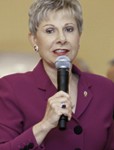Make Every Word Count: Be a Memorable Speaker
By Patricia Fripp, CSP, CPAE
In sales, what would happen if your prospects could vividly remember why others choose to do business with you? Would it be profitable for you if they felt that you were more focused on their needs than your competitors? You can have that impact with a memorable pitch, or speech. If people are making hiring decisions for consulting contracts or a large investment, they are probably going to be discussing with a team or committee what they heard from various vendors, consultants, or sales professionals. Your goal is to have them remembering and repeating your key ideas and benefits: you need to be a memorable speaker.
Your goal should be always to say something that will be remembered and repeated. If we ask audience members, “Who was the hit of last year’s convention?” usually they can recall the topic and that it was entertaining and dynamic, but if they can recite your key points, profound statements, or even that you appeared to know exactly what their lives are like, you’ve made yourself memorable. To be remembered and repeated, you need a simple structure for your speech. The following tips will help you construct your speech so that you and it will not be forgotten.
1. Organize. Is your presentation content organized in a logical way? Is it easy for you and your listeners to follow? The creative process is messy: brainstorming what ideas, stories, and concepts will go into your presentation. However, you or your audience will not remember your key ideas unless your presentation is arranged around a central theme or premise and the talking points that make that case. Think of them as your points of wisdom. Each point can be illustrated with your examples, case histories, and statistics. Even if you have short sentences, visual words, and great stories, if it’s difficult to keep track of exactly where you’re going, your audience isn’t going to remember and repeat your ideas.

At the beginning of a three-hour seminar, an expert said, “I will be addressing twenty talking points.” That is a lot for an audience to try to remember, but his content was amazing and his stories were wonderful. However, fifteen minutes before closing, he introduced key point three. Do you think the audience was able to remember and quote his key points? Because of no strong structure, no one could remember his points without looking at their notes.
2. Analyze. Listen to a recording of yourself, and even consider having a transcription of your presentation. Look for ways to be clearer, sharper, and more eloquent. What about sentence length? Do you run on and on, that may be considered natural in casual speech? Can you use shorter, more memorable sentences?
In the case of the previous expert, in his speeches on CD, his key points were unforgettable. The material was flawlessly organized, with no digressions or confusing irrelevancies: the content of his speeches had been skillfully edited. Repetitions and digressions had been deleted and material rearranged to move those common “Oh, wait, I forgot to tell you…” to the correct section. All the “ums” and “ers” were gone. It was a truly professional presentation!
With many of my own presentations, I send an MP3 to a transcription service, telling them I want every “er,” “ah,” “um,” “you know”—everything that came out of my mouth or my client’s. This helps us see what speech patterns, habits, or lack of clarity we need to fix, the first step to analyzing.
3. Edit. A commonly misused synonym for “delete,” “edit” actually means, “to correct, revise, or adapt.” Correct by filling in any unintentional blanks in the logic of your speech. Revise by deleting repetitions, digressions, fuzzy phrases, and meaningless clichés (For example, “today” is the most overused, impact-diluting word in business communication.) Adapt by framing the material for your specific audience. It is important you address your subject from the audience’s point of view or interest.
Most presenters, even executives, are great once they get started; however, surprising few know how to start with impact. A sales executive was reviewing her content for a very important webinar. Her visuals were fabulous and her speech was very well structured; however, her opening and close were the low points. Her opening line was, “I’m very glad we’re talking about this today.” Wishy-washy!
A good idea would be to open with her key idea: “If you can’t negotiate, you’ll never close the sale.” She could also make it a question and involve the audience with the answer: “Why do negotiations get less attention than other business skills? Because people equate ‘price’ with dollars.”
4. Specify. Using specificity builds credibility. Speakers can immediately improve their speeches and articles by using words that are more precise. For example, you say, “I went to a networking event and walked out with bunches of cards of good prospects.” A “bunch” should only refer to grapes. How big and useful was the pile of cards in your hands? However, if you say, “I left with two dozen cards, at least fifteen of them good prospects,” you have given a specific idea.
My pet peeve is the word “stuff.” Always use explicit language – “research,” “experience,” “leading edge strategies” or “technical formulas” – whatever is relevant. Specificity makes you sound valuable; much more so than “things” or “stuff.”
If your goal is to be remembered in your keynotes, sales conversations, or presentations, use these techniques to be powerfully pithy! After all, what would it mean to your business if every time you spoke you engaged, inspired, informed and were a resounding success?
If you need help with your presentation skills, sales conversations, or executive presentations check out Patricia Fripp value packs and Became the Ultimate Speaking Star.
https://fripp.com/publicspeakingresources/becomeaspeakingstar.html
Why not check out Lady and the Champs 2012 The How To Speaking Conference. http://www.worldchampslive.com/champcamp-lady.html
